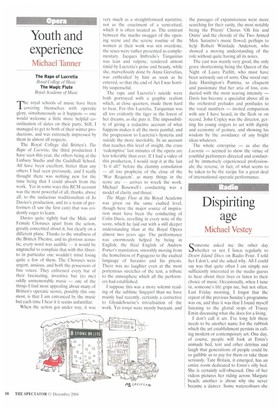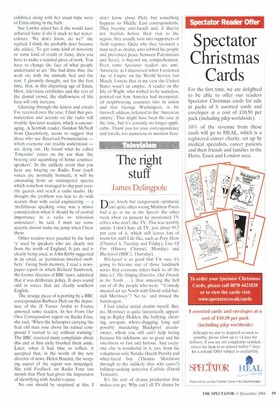Radio
Dispiriting age
Michael Vestey
Someone asked me the other day whether or not I listen regularly to Desert Island Discs on Radio Four. I told her I don't, and she asked why. All I could say was that quite often I am simply not sufficiently interested in the studio guests to hear about their lives or listen to their choice of music. Occasionally, when I tune in, someone's life grips me, but not often. Last Friday morning, I forgot that the repeat of the previous Sunday's programme was on, and thus it was that I found myself listening to the glottal stops of Tracey Emin discussing what she does for a living.
I don't call it art. I've long felt there needs to be another name for the rubbish which the art establishment persists in calling modern or contemporary art. One day, of course, people will look at Emin's unmade bed, tent and other detritus and laugh that generations of people could be so gullible as to pay for them or take them seriously. Tate Britain, it emerged, has an entire room dedicated to Emin's silly bed. She is certainly self-obsessed. One of her videos pictures her riding across Margate beach; another is about why she never became a dancer. Some watercolours she exhibited along with her usual tripe were of Emin sitting in the bath.
Sue Lawley asked her if she would have achieved fame if she'd stuck to her watercolours. We don't know, do we?' she replied. I think she probably does because she added, 'To get some kind of notoriety or some kind of credit or fame, then you have to make a seminal piece of work. You have to change the face of what people understand as art.' She had done that, she went on, with the unmade bed and the tent. I gloomily thought, not for the first time, that, in this dispiriting age of Emin, Hirst, television celebrities and the rest of the dismal crowd, the shallowness of life here will only increase.
Glancing through the letters and emails I've received over the year, I find that pronunciation and accents on the radio still trouble Spectator readers, which is encouraging. A Scottish reader, Gordon McNeill from Oueensferry, seems to suggest that those who use Received Pronunciation — which everyone can readily understand — are dying out. He found what he called 'Estuarine' easier on the ear than 'the braying and squawking of home counties' speakers'. In the unlikely event that you hear any braying on Radio Four (such voices are normally banned), it will he emanating from an endangered species which somehow managed to slip past security guards and reach a radio studio. He thought the problem was less to do with accents than with social engineering — a 'mellifluous speaking voice was a minor consideration when it should be of central importance in a radio or television announcer', he said. I must say some accents almost make me jump when I hear them.
Other readers were puzzled by the hard 'a' used by speakers who are clearly not from the north of England. It jars and is clearly being used, as John Kirby suggested in an email, as 'pernicious inverted snobbery'. Going from memory, I read a newspaper report in which Richard Sambrook, the former director of BBC news, admitted that it was deliberate policy. It does sound odd in voices that are clearly southern English.
The strange piece of reporting by a BBC correspondent Barbara Plett on the departure of the ill Yasser Arafat to France annoyed some readers. In her From Our Own Correspondent report on Radio Four, she said, 'When the helicopter carrying the frail old man rose above his ruined compound I started to cry without warning.' The BI3C received many complaints about this and at first airily brushed them aside. Later, when it had time to reflect, it accepted that, in the words of the new director of news, Helen Boaden, the weeping aspect of the report was misjudged. She told Feedback on Radio Four last month that Pion had given the impression of identifying with Arafat's cause.
No one should be surprised at this. I don't know about Nett, but something happens to Middle East correspondents. They become anti-Israeli and, if they're not Arabists before their visit to the region, they usually turn into supporters of Arab regimes. Quite why they favoured a man such as Arafat, who robbed his people and prevented peace between Palestinians and Israel, is beyond my comprehension. Even some Spectator readers are antiAmerican, as I discovered when I reviewed Age of Empire on the World Service last March. I wrote that in my view the United States wasn't an empire. A reader on the Isle of Wight, who wished to be nameless, pointed out how America had incorporated neighbouring countries into its union and that George Washington, in his farewell address, referred to the 'American empire'. That might have been the case at the time, but it's certainly no longer applicable. Thank you for your correspondence and emails, too numerous to mention here.











































































 Previous page
Previous page